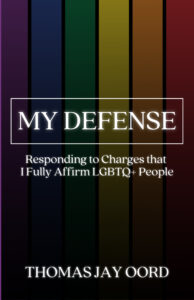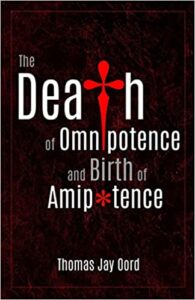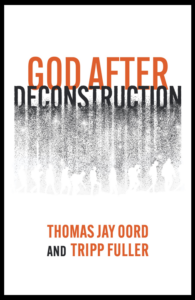Six Ideas that Helped My Queer Trial
I recently met with students at the Vancouver School of Theology. Geoffrey Clark-Tosca invited me to talk about queer issues and my expulsion from the Church of the Nazarene.
I found the conversation meaningful, as I have when talking with other groups about this topic. I explained how I became fully affirming of queer people and shared the events that led to my trial and defrocking/excommunication.
Besides sharing the narrative, I pointed to six ideas that helped me as I faced my queer trial in July 2024. Here are those ideas.
Organizations are organisms, not mathematics: they change.
More than a few people thought I should simply walk away from the Church of the Nazarene rather than try to seek change. “There are other groups you can join,” they said. While this is true, I got the feeling that many thought the denomination’s view on human sexuality was set in stone. It’s unchanging.
I think organizations are evolving organisms rather than immutable mathematical equations. A look at the history of Christianity and the Church of the Nazarene reveals many changes. Thinking of denominations as organisms gives hope that positive change can occur.
We each have unique calls to love: my call is different from others.
When I tell my story and describe my fight for change in the Church of the Nazarene, I’m quick to say, “But what I did isn’t required of everyone.” While I stayed and fought, I respect the choices of others to leave without fighting. And of those who fight more quietly from the inside. My way isn’t the only way.
I have privileges and a voice that others do not. I have a support network of family, friends, and a lifelong supportive partner in my wife Cheryl. Others are less fortunate. My status as a significant theologian also gives me a platform of influence that others don’t possess. I’m relatively financially stable. And so on.
How God calls me to work for full queer inclusion will differ from how God calls others.
Humans should not be divided into neat binaries: “human nature” is a myth.
Aristotle has greatly influenced Western views of what it means to be human. He thought each species had a particular essence, and all creatures in a species share that essence in common. In terms of humans, this essence is called “human nature.” In terms of human sexuality, many have divided humans neatly into male and female, each with an attraction to the other. All else is “unnatural” because it transgresses their essence.
Darwin’s evolutionary theory overturns Aristotle’s views about essences and natures. And this is good news for queer theory. Rather than strict binaries and specified elements of a single human nature, queer theory rightly points to non-binaries, diversity, and no human nature shared by all humans. Fluidity abounds. It helps me to make sense of LGBTQ+ people, with their diverse orientations, identities, and sexual behaviors, if I remember humans are diverse.
God doesn’t cause or allow injustice: God’s not to blame.
For several decades now, I’ve been arguing that God doesn’t possess the power to control creatures. Uncontrolling love is God’s eternal nature, and it is the mode of divine providence in the world. God always loves everyone and everything, so God can’t control anyone or anything.
Believing that God can’t control helps me face what I consider the injustice of my trial. It helps when I think about the injustices that queer people face. I don’t have to believe God causes or even allows unnecessary suffering, as if God had the power to prevent it. Or as if it’s part of some plan. Instead, the uncontrolling God of love influences and consoles, but cannot control. That’s good news for all of us! (I explain this idea in several books, but see The Death of Omnipotence and Birth of Amipotence.)
Rather than settled, the future is open; it will be decided by God, me, and creation in collaboration.
Alongside the notion that institutions are organisms is the notion that these organisms are not predetermined. Instead, they live moment by moment, moving into an open and yet-to-be-decided future. Rather than outside time, God also lives moment by moment, influencing creation and being influenced by it. Both God and creatures are experiencers.
Believing that I move with God and creation into an open future provides ground for hope. Instead of thinking the outcomes of life and my trial were settled in advance, I think many outcomes are possible. Some are more likely than others, of course. But our actions make a real difference to what happens in the present, and we influence how the future will be. (I explain this in God After Deconstruction.)
We make a difference to God’s project of love: our influence extends beyond death.
When I was handed charges in the summer of 2023 and told I’d face a trial, I suspected the verdict would mean I’d lose my ministerial credentials. It wasn’t pre-determined, but it was likely. Although the future is open and there were many possibilities, I’d seen how other Nazarenes (like Dee Kelly) were treated. I was publically and repeatedly advocating for change in the denomination’s statement on human sexuality.
My belief that God is affected, active, and everlasting means that what I do influences God and creation. And my actions continue to exert influence after I die, because God takes what I do into the everlasting divine life. This is called “objective immortality” in some circles, and “contributionism” in others. We can contribute to God’s agenda of love.
Conclusion
Theology matters. The recent trial and events leading to it confirm this. I would have acted differently if I didn’t believe the ideas above. Open and relational theology makes a difference!




Comments
Top shelf stuff! The priceless free gift of enlightenment is on full display. May many reconsider their allegiance to endarkenment masquerading as light.
“Jesus, please help me set aside RELIGION, pursue the GOSPEL MESSAGE, and learn the difference.”
Thanks for your kind words of encouragement, Alan!